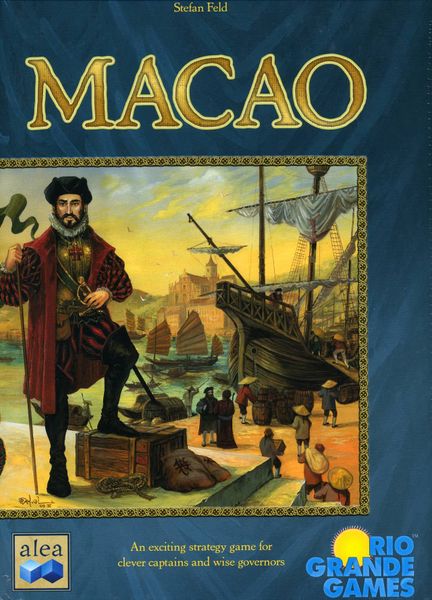Macao (2009) Board Game
Macao is a board game that was released in in 2009. It is designed by Julien Delval and Harald Lieske, and published by alea and Ravensburger. The game is set in the Portuguese trading colony of Macau during the Age of Sail. Players take on the role of traders trying to establish their businesses and gain influence in the city.
Game Components of Macao
How To Setup Macao
To set up Macao, place the game board in the middle of the table. Each player selects a color and takes the corresponding player mat, wind rose, ownership markers, ship, and player order disc. The board is laid out with goods tiles on city spaces, office cards along the edge, and building/person cards in a face-down stack. Each player starts with 5 gold coins and places their initial action tokens on the wind rose. The tribute table and scoring track are also set up according to the rules.
Gameplay Mechanics and Game Objective
Game Objective
Gameplay Mechanics
Player Experience
Macao offers a rich and engaging experience with a steep but manageable learning curve. Players must balance multiple strategies, including card management, resource allocation, and spatial planning. The game’s mechanics, such as the wind rose and dice rolling, ensure that all players have equal access to resources, eliminating hoarding and haggling. This setup encourages strategic thinking and decision-making, making each round dynamic and challenging.
Pros
Cons
Personal Thoughts on Macao
Macao is an excellent choice for fans of complex, strategic board games. It is particularly suited for players who enjoy resource management, card drafting, and spatial planning. While it may not be the best fit for casual gamers due to its complexity and length, it offers a highly rewarding experience for those willing to invest the time to learn and master its mechanics. For groups of 3 or 4 players, Macao provides a dynamic and competitive environment that challenges players to balance short-term needs with long-term strategies.
We are supported by our audience. When you purchase through links on our site, we may earn an affiliate commission, at no extra cost for you. Learn more.

